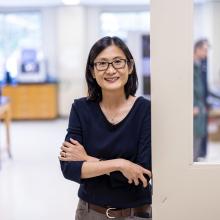Baylor Launches Interdisciplinary Materials Science Ph.D. to Fuel Innovation
Baylor is launching a new Ph.D. program in Materials Science & Engineering by leveraging faculty strengths and societal needs, highlighting the university's commitment to collaborative, multidisciplinary approaches.
Baylor’s pursuit and attainment of R1 research recognition was driven by focused investment in research, faculty and students—a purposeful journey that revealed numerous opportunities for growth in postgraduate programs. At the intersection of societal need and faculty strengths throughout the institution, Baylor is launching new programs in key fields of study.
One example comes in materials science, an area of study that was listed in Illuminate, the University’s strategic plan from 2019-2024, as a signature academic initiative. Materials science efforts provide a meaningful example of the University’s approach to program growth—multidisciplinary fields that are collaborative by design.
The Baylor University Board of Regents recently approved a new Ph.D. program in Materials Science and Engineering (MSE). This program will foster new collaborations across departmental lines with hires from various fields such as Chemistry, Electrical Engineering, Environmental Science, Geosciences, Mechanical Engineering, and Physics.
Though the field of materials science has been actively studied by Baylor faculty and students for years, its research has been segmented and spread across many different departments. With the creation of the MSE graduate program, the gap between departments will be bridged, paving the way for more efficient and conclusive research.
Innovative Educational Experiences
The Materials Science and Engineering Ph.D. program enables the advancement of countless technologies, and Baylor University’s research funding comes from a wide variety of sources, such as the National Science Foundation, the Office of Naval Research, the Army Research Labs, the Air Force Research Labs, the U.S. Department of Energy, and many industrial partners.
As a result, doctoral students who enroll in the program will not only have the unique opportunity to engage with a wide variety of faculty members from different fields, but also the ability to become immersed in innovative educational experiences.
The MSE Ph.D. program has been under development at Baylor for the past decade. David Jack, Ph.D., professor of Mechanical Engineering, discussed the importance of the field. “When it comes to cars, planes, trains, many of the technologies are material advancements,” he explained. Materials science research is clearly evident in the world around us.
MSE is enabling the capabilities and technology for many of the advanced innovations we have.
– David Jack, Ph.D.
Dr. Jack also discussed the timing and fit of the MSE Ph.D. program at Baylor. “It leverages a lot of our existing investments…We need this doctoral program to continue growing this research enterprise," he said. “We need an umbrella to put everybody under.”
Not only does the MSE Ph.D. program present the opportunity to unite a variety of fields, but it also provides students with the ability to gain hands-on experience. William Hockaday, Ph.D., associate dean for research and associate professor of Geosciences, said that the graduate program’s interdisciplinary nature allows students to become team-oriented and exposed to varying elements of the industry.
“When students surpass me in their knowledge and expertise in a particular area, and I'm learning from them, that's the best,” said Hockaday.
As the need for research in MSE continues to grow, Baylor’s doctoral program will facilitate innovation.
Julia Y. Chan, Ph.D., professor of Chemistry, Biochemistry, and Materials Science, as well as the Tim and Sharalynn Fenn Family Endowed Chair in Materials Science, described the opportunistic nature of the program. “A materials science and engineering Ph.D. program will enhance graduate recruiting of prospective doctoral students, knowing that they will have the opportunity to interact with materials science faculty across academic units,” she said. Chan went on to emphasize the opportunities available outside of the institution.
Given the wide range of industries in Texas, the program will also lead to partnerships, hence enhancing educational experience and opportunities. Students trained as materials scientists will solve the world’s most exciting problems benefiting humankind.
– Julia Chan, Ph.D.
Baylor’s MSE Ph.D. program is one example of new programs that will enable the advancements of society and technology, or understanding in other fields. Simultaneously, these new programs will Baylor’s external research support system, enabling Baylor to advance its tradition of producing well-rounded leaders and providing solutions to enhance quality of life.
You can read more about the growth of Baylor Graduate School Ph.D. programs in the 2023 Annual Report.
ABOUT BAYLOR UNIVERSITY
Baylor University is a private Christian University and a nationally ranked Research 1 institution. The University provides a vibrant campus community for more than 20,000 students by blending interdisciplinary research with an international reputation for educational excellence and a faculty commitment to teaching and scholarship. Chartered in 1845 by the Republic of Texas through the efforts of Baptist pioneers, Baylor is the oldest continually operating University in Texas. Located in Waco, Baylor welcomes students from all 50 states and more than 100 countries to study a broad range of degrees among its 12 nationally recognized academic divisions.
